The coming together of six Kashmir based parties on the reading down of Article 370 surprised all, especially New Delhi. Used to no-holds-barred fights, finding a common ground has been a rarity. How it happened and what could be its likely course of action, Masood Hussain reports.
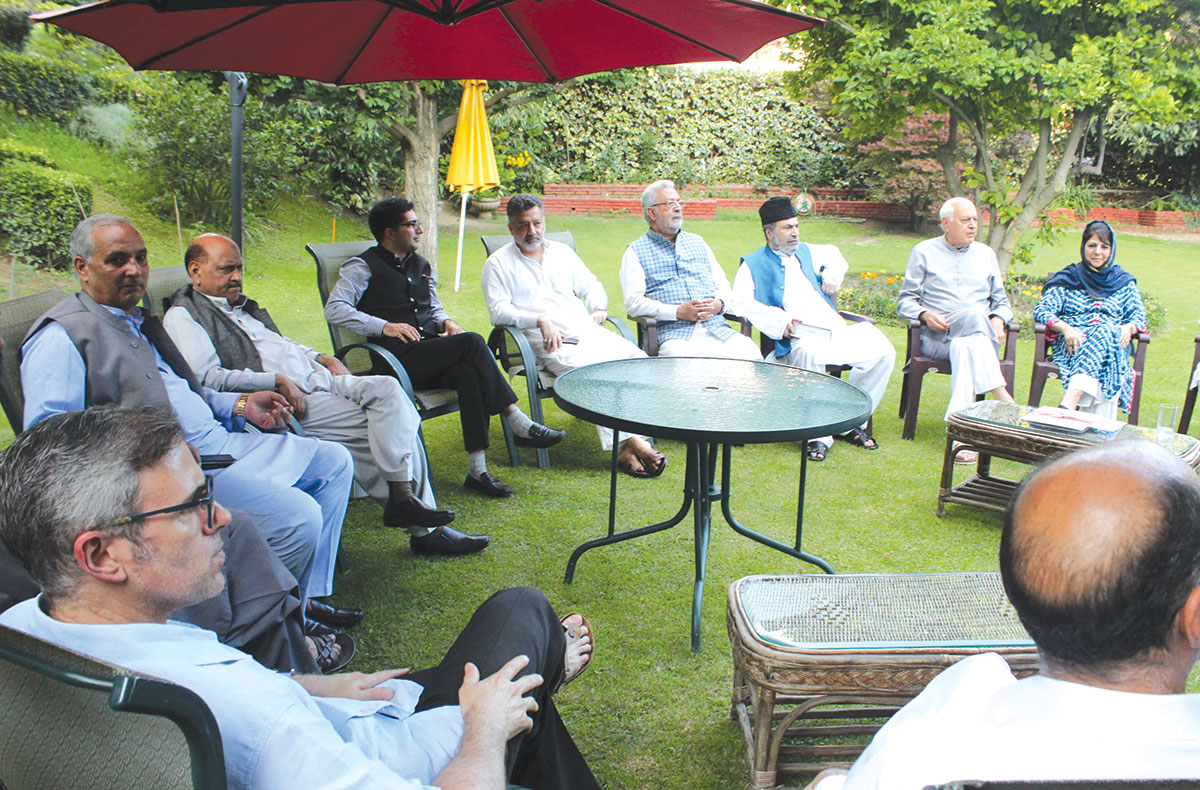
On August 22, noon when the Gupkar Declaration 2.0 landed in the newsrooms, it surprised everybody. It took hours to understand that the element of surprise was in almost every quarter – the intelligence community was as oblivious of the happenings as the second and third cadre of the unionist mainstreamers were.
The statement regretted the “spitefully short-sighted and unconstitutional move” that abrogated Article 370 and 35A, made the constitutional of Jammu and Kashmir “un-enforceable” and “bifurcated and relegated” the state to the status of two Union Territories has “unrecognizably changed the relationship between J&K and New Delhi”. It said the “grossly unconstitutional” and disempowering intervention challenged the “basic identity of the people” and were “accompanied by repressive measures meant to silence people and coerce them into submission and continue unabated”.
“We all reiterate our commitment to collectively fight to restore the Special Status of J&K as guaranteed under the Constitution and the commitments made from time to time,” the statement endorsed by leaders of six parties – NC, Peoples Democratic Party (PDP), Congress, CPI(M), Peoples Conference (PC) and Awami National Conference (ANC), said. “There is unanimity amongst us that collective institution is the effective way to fight for these rights and tirelessly struggle to get back the special status and restore the Constitutional guarantees forcibly taken away, against our will.” It termed the status quo ante of August 4, 2019 as the collective “sacred goal” and insisted that there can be “nothing about us without us”.
In the subsequent days, JK Peoples Movement, the party founded by the IAS officer, Dr Shah Feasal (who has already dissociated from politics), seconded the move as CPI’s Abdul Rehman Tikroo walked to Dr Abdullah’s home to extend his support to the move.
An Invisible Consensus
Such a move was expected but the element of surprise made it slightly different. Dr Abdullah had called an all-party meeting on August 5, but the authorities did not permit it. He then took the government response in the court case – about the petitions seeking the release of his party men, to see if the utterances in the courtroom should be taken at face value. He publicly invited a group of party leaders to his home on August 20. After having a meeting, he later permitted the media for group interaction. He repeatedly insisted that the idea of a meeting was to check the government sincerity on the issue of individual liberty of his leaders.
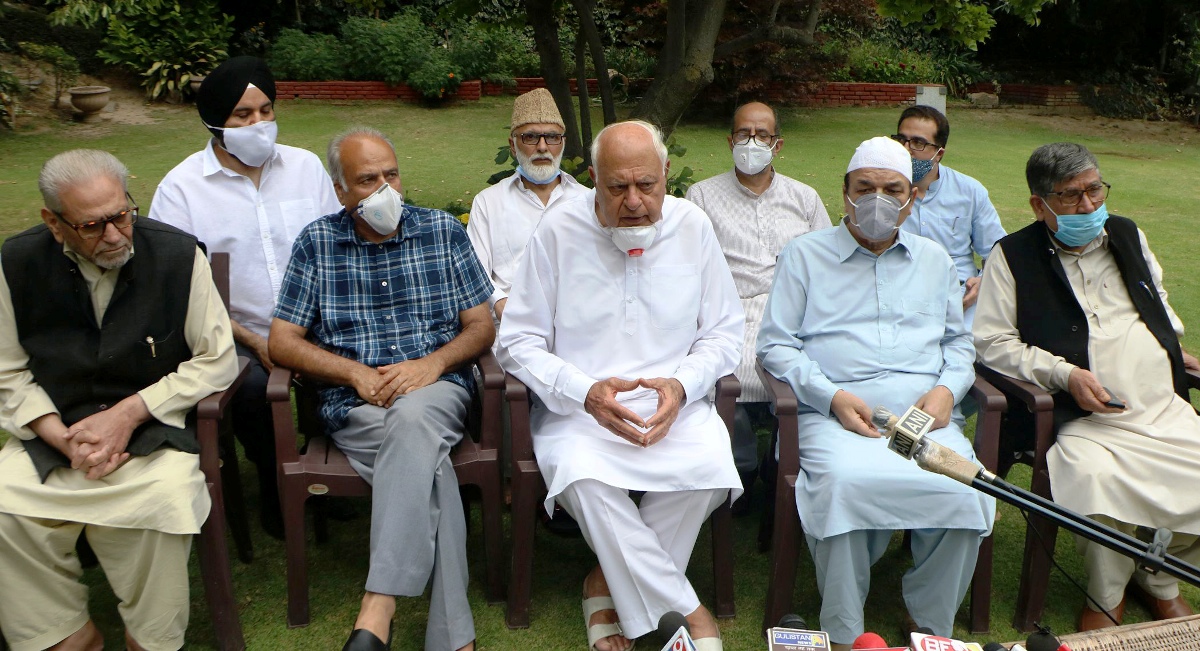
“We will talk on issues once all are out and free,” Dr Abdullah said. “That day, when we will have discussions, then we will tell you, what we intend to do.. then you grill us on everything.” Insisting that he “we are not going to be silent”, Dr Abdullah told a questioner that they are not running away from Gupkar Declaration. He also admitted he was in touch with Mehbooba Mufti, who is still under arrest at home.
A day later, he visited Ali Mohammad Sagar and also went to Chrare-e-Sharief. During this outing, he did see the mood of the people at many places. At least at one place, he had to listen to quite “acidic” response from some youth.
By then, however, insiders said the consensus had already evolved and the draft was in making. “To be fair with everybody, it (declaration) just happened,” one politician, privy of the developments said, insisting they all were in touch for a long time. “I personally think, Dr Abdullah had made up his mind that the battle is not a solo one and that realisation had perhaps come after he flew from Delhi.”
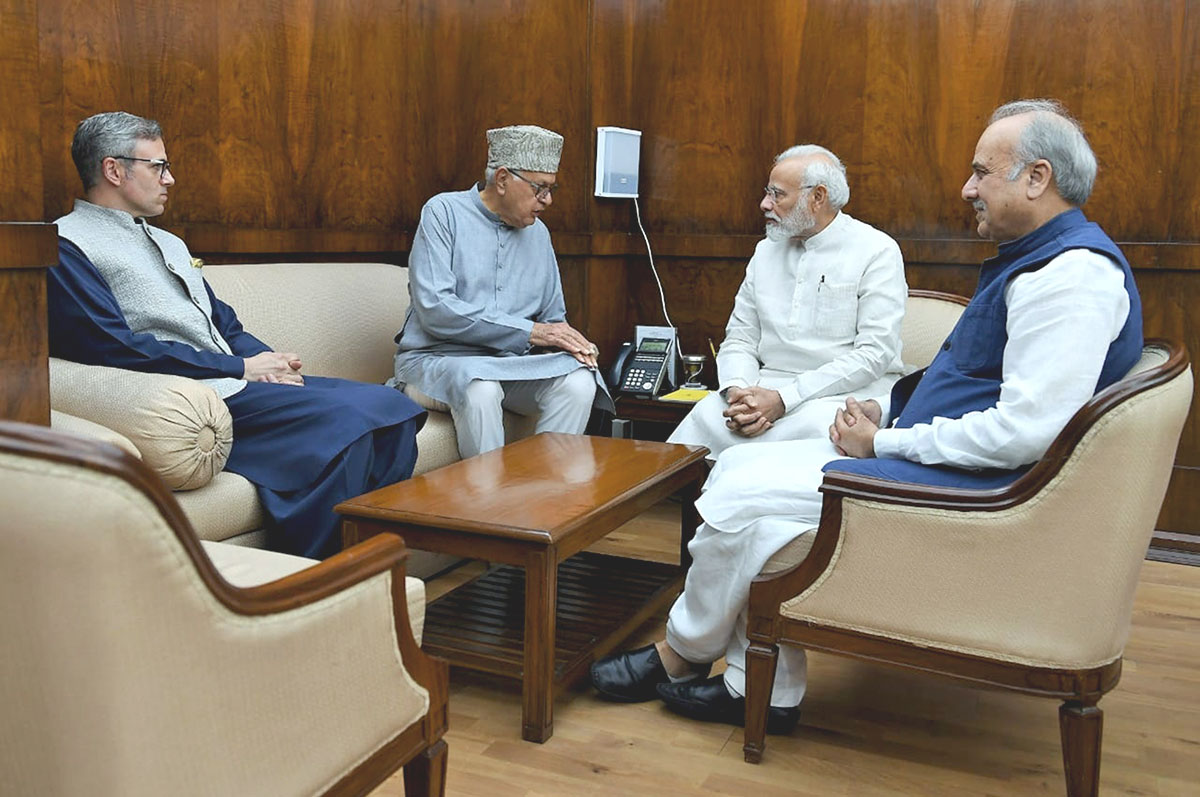
It was on August 19, when some of them happened to be at the home of Justice (retired) Husnain Masoodi. Host apart, it was Dr Farooq Abdullah, Communist leader Yousuf Tarigami and Sajjad Gani Lone. It was a luncheon meeting. “We discussed the situation there and decided that while we must stand together against the onslaught, we must express it publicly and invite all others to join in this fight,” Tarigami said.
On Dr Abdullah’s directions, the work for the draft started there and then. He personally talked to leaders of other parties. He rang up Ms Mufti telling her that “your initiative” – reference to Gupkar Declaration of August 4, 2019, is going to for an upgrade. “To be fair with everybody, we had to call on the telephone or exchange the WhatsApp messages and for that 2G was adequate,” one of the politicians said. “At one point of time, when the final draft was ready, Dr Abdullah was trying to find ways in which he could send the document to everybody for mandatory signing. Then somebody suggested to him that in the IT age, everybody will publicly endorse the statement after it is released. That is how it happened.”
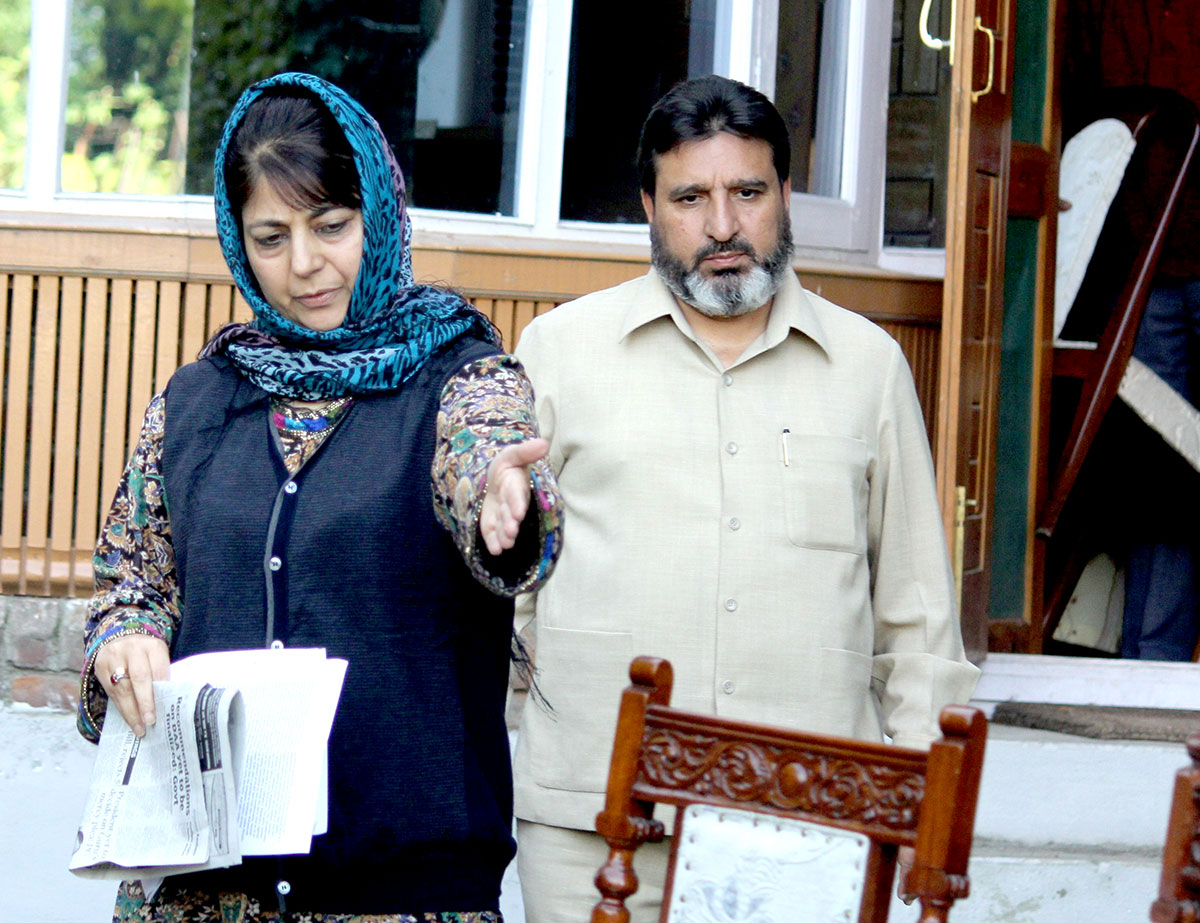
“We knew that if it has to be done, the secrecy was the only way-out,” one of the politicians said. “Had the administration got even a whiff of it, they might have used power to restrict us or to even re-arrest us.” The parties lacked any crisis in the leadership of the group. Dr Farooq Abdullah was a unanimous choice. While accepted it, NC source said, he was emotional saying that he is not only “serious” but he “values” this (position) much more than his stature of leading Jammu and Kashmir as Chief Minister, many times.
The Significance?
After the political leaders were imprisoned in jails and in homes In August 2019, the BJP response had three key elements, according to PDP leader Naeem Akhter. “The people in Jammu and Kashmir have accepted it and new leadership will emerge. The panchayat leadership will work at ground zero and the development deficit will be managed,” Akhter said. “The fact is that neither the people have accepted it, nor a new leadership has emerged on our ruins.” The declaration endorsed the rejection of all these “lies”. He insisted that there is not a single credible voice in the favour of what Government of India has done to Jammu and Kashmir. “The fact is that the people who celebrated it in Jammu or Leh are now publicly talked against it,” he said.
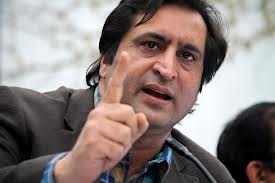
Within days after the abrogation of the special status, the top BJP leaders had suggested that the political class in Jammu and Kashmir must start getting back to politics by seeking the statehood. With most of the political class still in jail, there were voices for statehood and 4G. The declaration has shut all those voices.
What is interesting is that signatories to the declaration are Kashmir’s entire political class and most of them were erstwhile allies of the BJP. Vajpayee era had Omar Abdullah as its junior foreign minister. PDP that literally was born in BJP era was ruling Jammu and Kashmir with the BJP till the latter pulled out of the alliance in 2018 summer. Sajad Lone was a cabinet minister from the BJP quota in the BJPDP government. In the fall of 2018, he came with BJP mandate to stake a claim for the government when NC and PDP had joined hands to have some sort of an elected government. The then governor Satya Pal Malik lacked a fax machine to receive the letters and instead dissolved the assembly!

Had any of them or some of them agreed to work for the Jammu and Kashmir wrecked by August 5, it would have been a huge BJP success. It is generally being believed that these parties have gone with the mood on the street. People on the streets do see it a “realisation” that they were fighting with each other “to massage their own egos”.
“It is an existential crisis,” Tarigami said. “They are not only attempting to undo the 5000 years of our history and culture by trying to alter the demography but they are trying to destroy the last 200 years of coexistence between Jammu, Ladakh and Kashmir.”
In the last year, political parties were split. PDP has actually split with most of the camp joining Altaf Bukhari’s Apni Party. Dr Shah Feasal, who resigned from service and floated a party, is now out of politics.
“The public mood, disinterested and dampened as it is, is in favour of a unified approach. Indeed, it has been so ever since the results of the election of 2014,” wrote Haseeb A Drabu, former minister, who quit politics after the last assembly was dissolved. “At the moment it is nothing more than an opportunity for the political class to redeem itself in its own eyes; redemption in the eyes of the people is still some distance away.”
“It is a fact that the elders across political parties are unanimous on one thing, we should go to our graves peacefully,” one leader told this reporter. “We did a lot of mistakes and compromises but now we want to put up a resistance so that we are not mutilated after our death.”
The younger lot sees it as the beginning of a conversation and breaking the “enforced silence”. But at the same time, the goalposts have changed too. Earlier, they were seeking autonomous Jammu and Kashmir that is empowered and now they want a return to August 4, 2019.
The Congress
What is interesting is that the political party that has been the key player in diluting what they offered after negotiations around and after 1947 is also part of the same bandwagon.
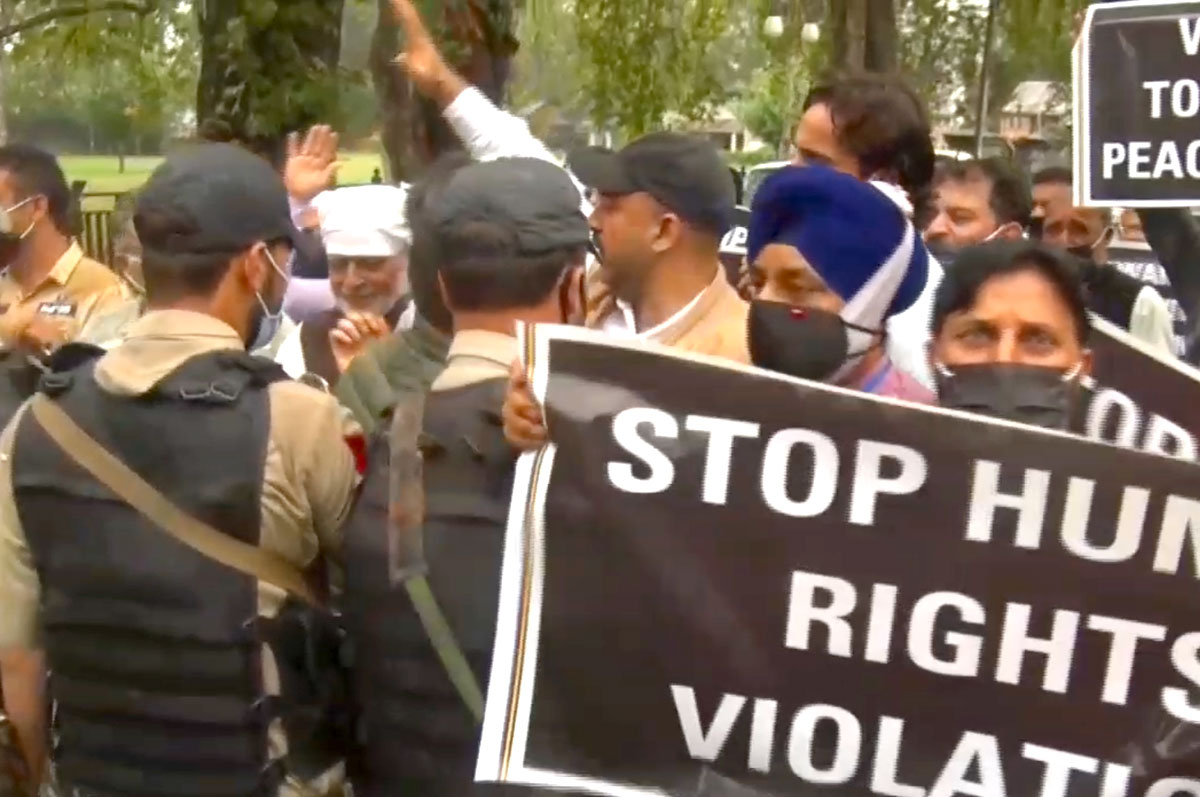
“People do ask us that we have been a party in diluting the special status,” state Congress president, Ghulam Ahmad Mir said. “But what they do not realise is that whatever Congress did was done with the state government in hand-in-hand. Tell me one such instance in which the Congress resorted to what BJP did in 2019?”
Mir said the Congress has been part of the Gupkar declaration from day one. When the first meeting took place in August 2019, Mir said he was in Jammu. “When I was invited, I sent Taj Mohiuddin sahib. We were never out of it,” he said.
Insisting that Congress as a national party is supportive of undoing August 5, 2019, Mir said the loudest voices against the intervention were that of Congress – Ghulam Nabi Azad, Kapil Sibal, Shashi Tharoor, P Chidambaram and Adhir Choudhary. “There are Congress Working Committee resolutions in support of what we are doing,” Mir said. “The day those resolutions will change, I may also change but the fact is that Congress is solidly behind the initiative”. Mir said that the people may not give Congress credit “but the fact is that while Modi won by exploiting Kashmir, we lost by defending Kashmir in the last Lok Sabha election.”
BJP Reaction
What makes the entire story interesting is that the BJP has skipped reacting to the development at the national level. They have not even castigated Congress for undoing a national project, not at least, so far.
Initially, the reaction came locally from the state BJP president Ravinder Raina. “Supporters of Gupkar Agenda are supporters of Pakistan, they are carrying on an anti-national agenda and are responsible for all the bloodshed in the region”, Raina’s said in Jammu, insisting the demand is “anti-national”. He said these parties are “daydreaming” when they are seeking restoration of the special status.
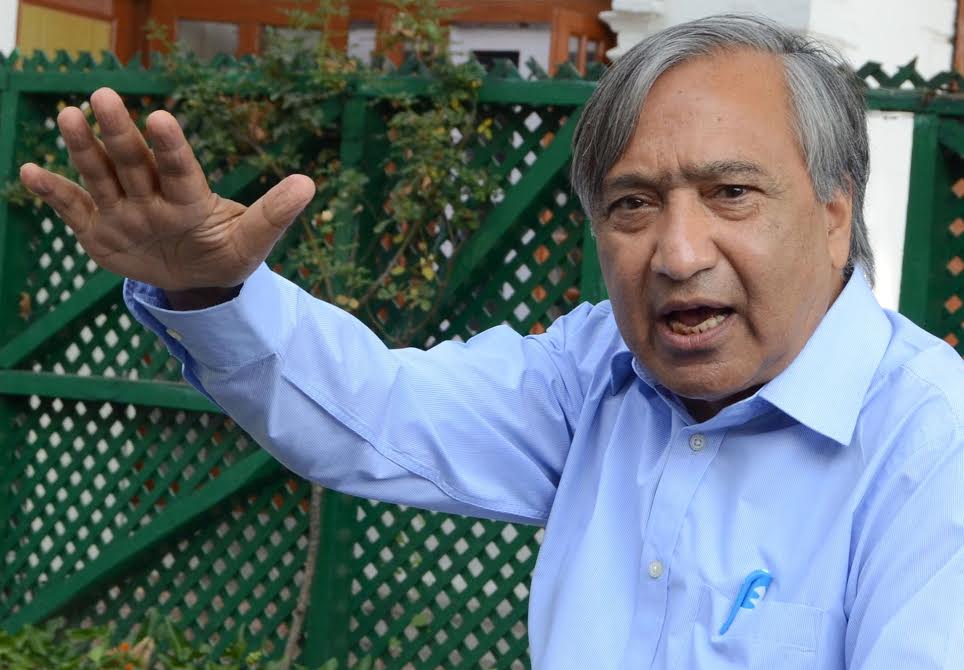
However, Ram Madhav, the BJP leader who has been handling Jammu and Kashmir for the last many years, after a night-long stay in Srinagar, did talk to his party leaders and reacted to the Declaration. Terming it a “mock-up of Sheikh Abdullah’s Plebiscite Front”, Madhav said it is “destined to fail”. Invoking past he reportedly said Sheikh “grabbed” the Chief Minister’s post and forgot the Plebiscite Front after he was set free from jail after 22 years. “After Sheikh’s death, NC leaders raised the issue of autonomy. But when the party came into power, it overlooked autonomy and started enjoying the power,” he was quoted saying, insisting it was a “political stunt”. He said August 5, 2019, was irreversible. However, Madhav or any national leader has not formally reacted to the development. Many think the party will react at “appropriate time”.
The response from Pakistan Foreign Minister Shah Mohammad Qureshi may eventually help the BJP to counter Congress. Qureshi told a presser that the rejection of August 5, 2019, by the Kashmir parties was “an important development” and a “political resistance movement”.
“A political resistance movement is gaining ground in Kashmir and the first sign is the joint statement…. What they said in the joint statement shows what is on their mind,” The Telegraph quoted Qureshi saying. “They are saying their political activities will be subservient to the sacred goal of reverting the status of J&K as it existed on August 4, 2019. It means they have rejected the August 5 decisions. It is a very big statement.”
Has Pakistan owned Kashmir’s unionist mainstreamers whose governments were being referred to as “puppets” is a different but interesting twist in the 370 tale.
Apni Party
The Jammu and Kashmri Apni Party that was born when the political class was in jail did discuss the issue for two days. There were voices referring to Article 370 in the past tense. An unidentified leader said the Gupkar Declaration signatories must come up with “concrete” and “time-bound” assurance on Article 370 and 35(A) instead of airing “impracticable slogans”. He said Apni Party will “close its political shop” if that happens. He said they are “befooling masses as they did in past”.
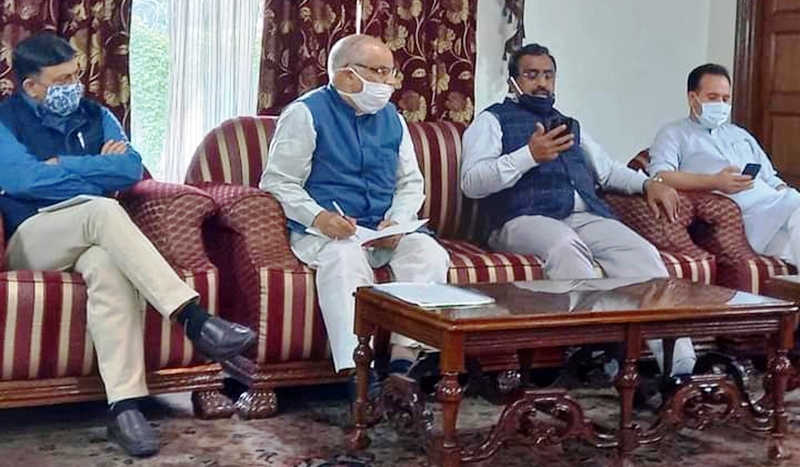
After the two-day deliberations were over, the party said they will press for an early hearing in a petition challenging the abrogation of Article 370 and Article 35-A in the Supreme Court. “It was resolved in the meeting to file an application before the Supreme Court seeking the listing and an early hearing in a petition filed by one of the Jammu and Kashmir Apni Party leaders challenging abrogation of Article 370 and Article 35-A,” the statement said. The Party assigned the task to party leader Jagmohan Singh Raina, one of the first few petitioners who had approached the Supreme Court on the subject. However, Bukhari, the party leader said his party’s bedrock was “realism and pragmatic politics”.
What Next?
There is nothing much on the next move right now, one former politician said. “It already is a major development,” he said. “The Kashmir politics is in black and white and there is unity in the most visible block that was usually being paraded before the world as being India.”
Added a politician who was part of the process: “The declaration created a noose of its own, people flouting it will hang automatically in the public perception.”
But there are voices that say they are heading towards the next step. Tarigami said that while the entire focus of the intervention was on Kashmir, Ladakh and Jammu are also the victims. “So we will be talking to them too,” he said. “We will tell them very honesty in Leh, Kargil, Jammu and other places that it is a fact that Kashmir has lost. But tell us, what is the net gain in the humiliation of August 5?” In the next stage, he said they will be talking to the political parties, civil society and the intellectuals in India.
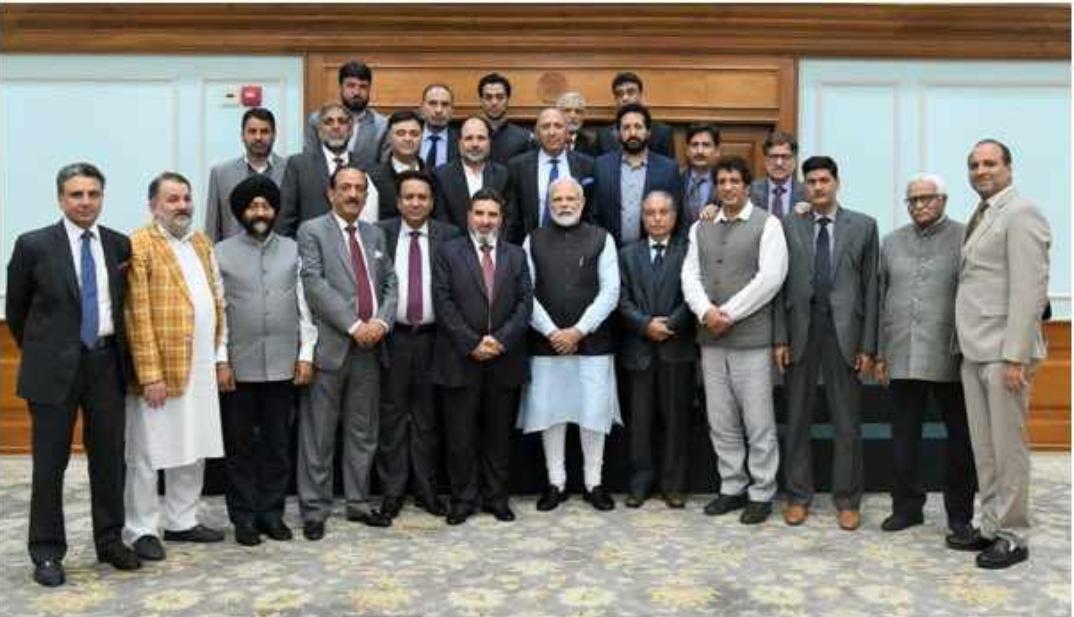
Congress’s Mir said they an immediate requirement to get ready for the next Lok Sabha session. “We have three NC MPs and three Rajya Sabha members including Azad Sahab. We will have to sit with them and tell them how we must tell our story”.
Akhter said breaking the enforced political silence is just the beginning. “We have to tell the people that there are no takers for the slogan of ‘with us or against us’,” Akhter said. “We also have to tell people that there is a strong external factor to the crisis as the action has internationalised Kashmir and now three nuclear powers are having parts of the Jammu and Kashmir territory. There is nothing outside the constitution, we are saying.”
Post Script
On August 29, 2020, National Conference called the first-ever meeting of its Political Affairs Committee (PAC) that was attended by its Jammu chapter virtually as members from Ladakh drove to Srinagar for participation. Omar Abdullah, who had stayed away from the chorus paving way for his father to manage the show, was also in the meeting. Sources said the participants discussed the entire issue revolving around Article 370.
The party came in strong support of the initiative. Members discussed the pros and cons of the Declaration insisting that the initiative must be broad-based involving the Jammu and Ladakh regions across party lines. There were certain apprehensions that the Declaration may be exploited by the BJP to deepen the regional divide. However, the members said the people in Jammu and Ladakh were completely in support of issues of land, jobs and other basics that they were deprived of by the unilateral decision-making on August 5, 2020.















